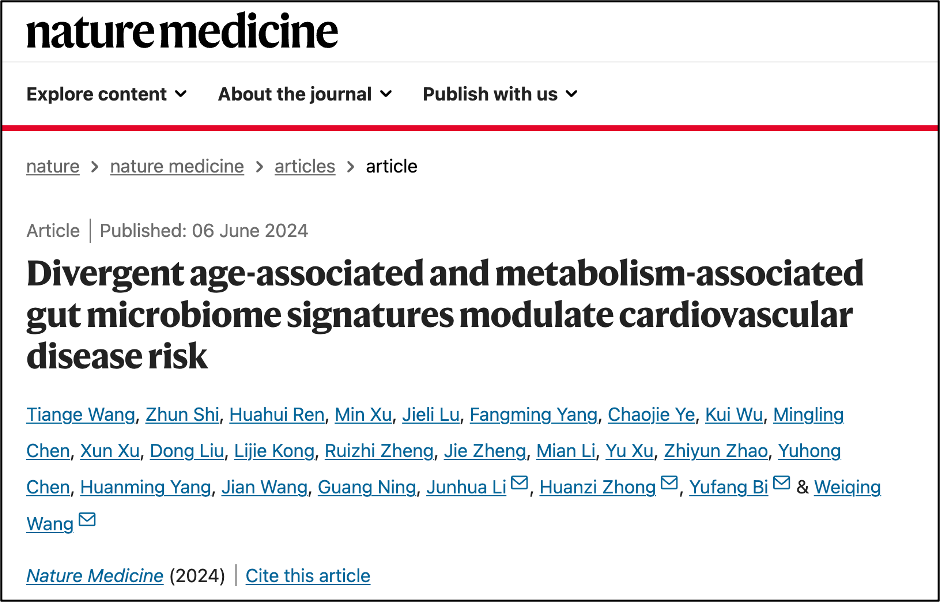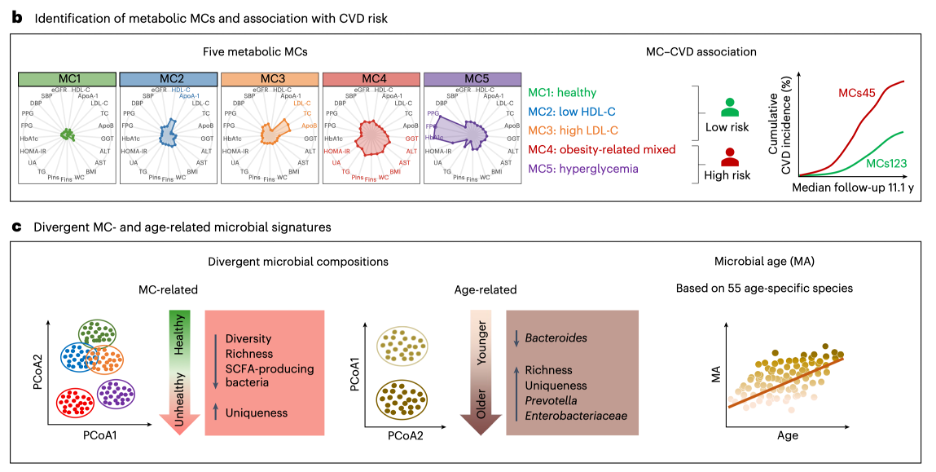Cardiovascular disease (CVD) is the leading cause of death globally, often linked to aging and metabolic disorders. As people get older, these metabolic disorders become more common and complicated, and CVD usually appears alongside other health conditions. Research shows that gut microbiome changes with age and differ across populations. These studies suggest that the gut microbiome could be crucial for healthy aging because it responds to lifestyle and medications, connects with the body's metabolism and immune system, and changes as we age.
Recently, a groundbreaking study published in Nature Medicine, led by BGI-Research, BGI Genomics, Shanghai Institute of Endocrine and Metabolic Diseases of Ruijin Hospital, Shanghai Jiao Tong University School of Medicine, and Shanghai National Clinical Research Center for Metabolic Diseases, has examined the interplay between the gut microbiome, aging, metabolism and long-term CVD risk. The study, titled "Divergent age-associated and metabolism-associated gut microbiome signatures modulate cardiovascular disease risk," presents a comprehensive analysis of how the gut microbiome's composition can serve as a bioindicator for CVD risk in the context of aging and metabolic health.
 The study “Divergent age-associated and metabolism-associated gut microbiome signatures modulate cardiovascular disease risk” was published in Nature Medicine.
The study “Divergent age-associated and metabolism-associated gut microbiome signatures modulate cardiovascular disease risk” was published in Nature Medicine.
The researchers classified 10,207 participants into five distinct metabolic multimorbidity clusters (MCs) based on comprehensive measurements of 21 metabolic variables. Each MC displayed its own unique metabolic subphenotype, with MC1 representing a metabolically healthy group and MC4 and MC5 characterized by obesity-related conditions and hyperglycemia, respectively. The latter two MCs demonstrated an increased risk of CVD by 75% and 117% in comparison to MC1, respectively, over an 11.1-year follow-up period.
From the metagenomic sequencing data obtained from 4,491fecal samples, a gut microbial age (MA) metric was developed using 55 age-related gut species, providing insights into the aging status of the human gut. Notably, younger individuals typically exhibit a higher abundance of Bacteroides species whereas Prevotella species are more abundant inolder individuals. More importantly, in MCs45 (metabolically unhealthy) individuals aged 60 years or older, the CVD risk was significantly amplified in those with a higher MA (higher abundance of Prevotella species) but was considerably mitigated in individuals with a lower MA. These effects were demonstrated to be independent of age, sex, and a range of lifestyle and dietary factors.
 Construction and validation of five metabolic MCs and evaluation of their associations with CVD risk.
Construction and validation of five metabolic MCs and evaluation of their associations with CVD risk.
Dr. Wang Tiange, the lead author at Ruijin Hospital, Shanghai Jiao Tong University School of Medicine, stated: “These findings underscore the pivotal modulating role of gut microbiota in cardiovascular health, particularly in metabolically unhealthy older adults, highlighting the potential of the gut microbiome as a promising target for health interventions. We are committed to advancing our research to develop targeted strategies aimed at modulating the biological age of the gut microbiota, which we believe hold substantial potential to reduce the incidence of cardiovascular diseases and promote healthy aging.”
“By applying metagenomics and the latest cutting-edge omics technologies to large-scale longitudinal human populations, disease-control populations, and clinical research cohorts, our collaborative efforts with partners are geared towards a more profound exploration of the omics markers associated with metabolic diseases and the aging process. We are not only identifying these biomarkers but also seeking to uncover new pathways to mitigate the impact of these conditions, thereby promoting overall well-being and longevity.” said Dr. Zhong Huanzi, co-corresponding author and a researcher at BGI-Research.
Ethical review approval was obtained for this study.
The study can be accessed here: https://www.nature.com/articles/s41591-024-03038-y



